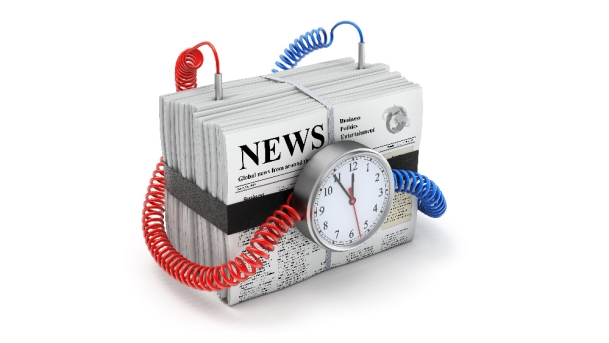
Contrary to conventional Gulf media style, the media campaign launched by various Gulf media outlets against Qatar’s policy and its national independent decision making in recent weeks has been conducted using peculiar and unusual language. The countries that launched the media campaign, Saudi Arabia, the United Arab Emirates, Bahrain and Egypt, went as far as severing diplomatic relations with Qatar and imposing a land, air and sea blockade.
The strategy of the communication effort shown by the propagandists has explicitly been revealed through the publication of fabricated statements allegedly given by the Emir of Qatar, Sheikh Tamim bin Hamad Al Thani, to the Qatari News Agency following the agency’s illicit hacking. Despite the Qatari denial of the fabricated statements and the emerging hypothetical political reality involving negative political perceptions and representations of Qatar and its political leaders, media outlets linked to Saudi, Emirati, Bahraini and the Egyptian authorities have relentlessly continued to promote their demonised image of Qatar.
A hypothetical political reality has emerged from the media campaign that aimed to present a negative image of Qatar. This explains the hasty move by the countries that led the media campaign not only to sever relations with Qatar, but also to mobilise their diplomatic efforts to impose an all-out action in a punitive and joint political, economic and social blockade.
The anti-Qatar campaign has been designed as a prelude for a cache of propaganda and media warfare that goes beyond traditional norms, rules and principles governing standard professional practices. The propaganda cache would then be used as a tool for hatching a political plot targeting Qatar's policies and leaders.
1. Media fabrications and propaganda patterns
When media outlets engage in planned and organised communications to promote fictitious stories and prod the public into believing their narratives, they are determined to reshape or modify existing media trends. This is what has been revealed by the propaganda campaign led by Saudi, Emirati, Bahraini and Egyptian media. The propagandists fabricated statements attributed to Sheikh Tamim Bin Hamad Al Thani about Qatar's relationship with Iran, Saudi Arabia, Hamas and the Palestinian Authority.
But the way the story was produced by Qatar News Agency after it was illicitly hacked has reasserted the readiness of Saudi and Emirati satellite channels and news websites to embrace and interact with the false news. To ensure their apparent success in this regard, they hosted Saudi and Egyptian analysts who delivered comments in the absence of counter opinion speakers. The firm denial by Qatar of the fabricated news and its continuous coverage of the serious consequences of the accusations have deliberately been ignored by campaign operatives. Instead, they heedlessly continued the transmission of all kinds of subversive and provocative propaganda in a clear sign that the fabricated statements that were intended to be truthful facts represented only the desired hypothetical political reality.
This emerging hypothetical political reality aims to build a stereotyped negative image of the State of Qatar, linking its name to the support and finance of terrorism as well as the embrace of extremist groups. Here, the propagandists tried to link Qatar and some of its civil institutions that have long been active in the field of humanitarian work in partnership with the United Nations to terrorism. The propagandists are fully aware of the strong impact of this stigma on the image of the state targeted by their incitement. Even if the media stops its propaganda and disavows it, it will nevertheless cause great damage to the image of the targeted state.
2. The impact of the media cache on the crisis
The impact and role of the media campaign on the strained relations between Qatar and the three Gulf states from which the propaganda campaign was launched aimed to target the country’s policy and its political leaders as well as exaggerate Qatar’s responsibility for the crisis. The context of the actions and reactions of the actors in this crisis provides indicators that help to understand the motives of their behaviour. The propagandists had linked the launch of their propaganda campaign to the occasion of a military graduation ceremony attended by Sheikh Tamim. The aim was to enable the fabricated story to gain an "added momentum" as well as give an exaggerated boom to the statements made by Qatari leaders.
The context of the propaganda campaign and the propaganda content help us understand the role of the media in this crisis. It is one of the tools of a political war that used diplomacy as well as the land, sea and air blockade intended to strangle the Qatari people.
A media brand of this type is perceived as a government-sponsored tool which makes it closer to propaganda than to media in achieving political and strategic goals. Such media often does not enjoy any freedom. But if freedom did exist, it would be limited to the extent allowed by the government. Media personnel would be forced to abide by an obligation to promote the interests of the ruling authority and defend its policies and interests. Under such circumstances, a contentious political environment would then be created, ultimately leading to political crises.
Components of the attempted negative stereotype attached to Qatar
- In their attempt to build up a negative hypothetical image for Qatar, the propagandists formulated an intellectual, psychological and behavioural model that would turn Qatar into a rogue state. The propagandists are seeking to link Qatari policy and political behaviour to unlawful and criminal acts that contradict internationally accepted norms and policies. (By accusing Qatar of embracing and financing terrorism, Qatar would be viewed as a tool for sabotage, destruction, sedition and instability.)
- This kind of propaganda discourse appears to be loaded with contradictions and does not take into account tangible facts or realities. It grossly ignores the country’s role in fostering political reconciliation, resolving crises (e.g. the Lebanon model) and establishing peace in conflict zones.
- The propagandists tried to strip Qatar of its independent national decision making as an entity belonging to regional and international powers. They have unjustly branded Qatar as an instrument in the hands of the Iranian regime and its allies, such as Hezbollah or the Houthi group, allegedly undermining Arab and Islamic national security.
- The essence of the current political crisis that has been triggered by regional countries sought to impose their will and guardianship on Qatar’s independent national decision making. This step would relegate the state’s role as a full sovereign GCC member.
- The propagandists have portrayed Qatar as a mouthpiece for sedition and discord through Al Jazeera Media Network which they perceive as an instrument of incitement and a major cause of stirring up unrest, strife and crises in the region. They view the network as dealing with Arab issues in a negative manner that incites hatred and fuels political polarisation.
- Hundreds of studies and dissertations about Al Jazeera have been published by prestigious academic institutions and organisations which underscore the importance of the role played by the channel in the Arab media scene since its inception in 1996.
- The promotion of rumours is a central tool for propaganda against Qatar that has culminated into a rumoured coup attempt in Qatar in an apparent attempt to sow incitement through subversive propaganda seeking to undermine the country’s social and political systems.
- Gross attempts have been made by propagandists to stigmatise Qatar and use emotional excitement coupled with satire, ridicule and the degradation of political leaders and political performance with disregard to standard media practices and the code of ethics.
Conclusion
The abovementioned media behaviour is fully dependent on the political authority and has become a mouthpiece for its agenda during political crises and conflicts in particular.
Professional media guidelines and ethics have been fully denied by ruling authorities who exercise effective control over media functions and practices. Such communication style seeks to create a new political reality to achieve specific goals and influence regional and international public opinion through psychological warfare.
Such propaganda style has culminated into an attempt to demonise individuals, groups and stated by creating a hypothetical political reality triggering a crisis aided with drastic measures such as land, air and sea blockades. This step is a prelude to the full domination of an independent state after the abolishment of its capabilities and the paralysis of its effectiveness.
____________________________________________
*This is a summary of a more extensive report written originally in Arabic by Dr.Mohamed Erraji and published on Al Jazeera Centre for Studies' Arabic website. To see the original report, click here: http://studies.aljazeera.net/ar/mediastudies/2017/06/170619125958504.html.
